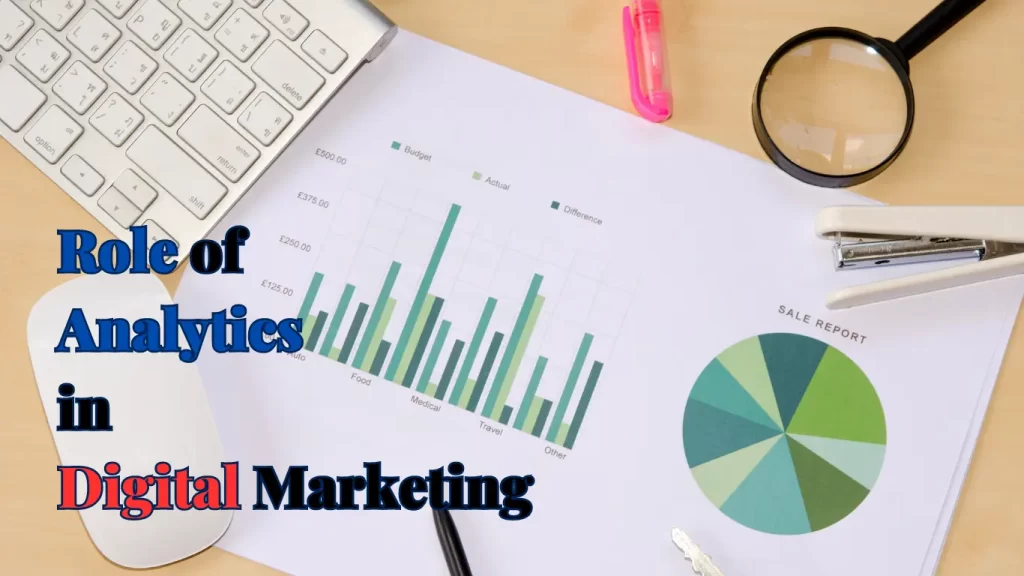The Role of Analytics in Digital Marketing

The Role of Analytics in Digital Marketing – In today’s digital age, where businesses strive to stay competitive and reach their target audience, the role of analytics in digital marketing has become paramount. Analytics provides valuable insights and data-driven strategies that help businesses make informed decisions and maximize their online presence. In this article, we will explore the importance and role of analytics and its various applications in the realm of digital marketing.
What is Digital Marketing?
Definition
Digital marketing encompasses all marketing efforts that utilize electronic devices and the internet to promote products or services. It includes various online platforms such as websites, search engines, social media, email marketing, and more.
Importance
Digital marketing offers businesses a wide reach, enabling them to connect with their target audience on a global scale. It provides cost-effective marketing solutions, facilitates precise targeting, and allows for real-time campaign monitoring and optimization.
Understanding Analytics
1. Definition
Analytics refers to the systematic analysis of data to extract meaningful insights and patterns. In the context of digital marketing, analytics involves tracking, measuring, and interpreting data to evaluate marketing performance and optimize strategies.
2. Types of Analytics
Digital marketing analytics encompasses various types, including web analytics, social media analytics, SEO analytics, and customer relationship management (CRM) analytics. Each type focuses on specific data sets and metrics to gain valuable insights.
3. Importance of Analytics
Analytics empowers businesses to make data-driven decisions, providing valuable insights into customer behavior, campaign performance, and overall marketing effectiveness. It enables marketers to identify trends, measure ROI, and optimize their strategies for better outcomes.
Role of Analytics in Digital Marketing
1. Data-Driven Decision Making
Analytics plays a vital role in digital marketing by enabling data-driven decision-making. By analyzing consumer data, marketers can gain a deep understanding of their target audience, preferences, and purchasing behaviors. This information allows businesses to tailor their marketing efforts for maximum impact and engagement.
2. Customer Behavior Analysis
Analytics provides insights into customer behaviour, helping marketers understand how customers interact with their digital assets. By tracking and analyzing user engagement, marketers can optimize their websites, landing pages, and user experiences to enhance customer satisfaction and conversions.
3. Campaign Optimization
With analytics, marketers can monitor and evaluate the performance of their marketing campaigns in real time. By analyzing key metrics such as click-through rates, conversion rates, and engagement levels, they can identify areas of improvement and optimize their campaigns for better results.
4. ROI Tracking
Analytics enables businesses to measure the return on investment (ROI) of their digital marketing initiatives. By tracking the effectiveness of various marketing channels and campaigns, businesses can allocate their resources more efficiently, ensuring that they invest in strategies that yield the highest ROI.
5. Personalization and Targeting
Analytics allows businesses to segment their audience and deliver personalized content and offers based on customer preferences and behaviours. By leveraging analytics, marketers can create targeted campaigns that resonate with specific customer segments, increasing the chances of conversions and customer loyalty.
Tools and Technologies
1. Google Analytics
Google Analytics is a widely used web analytics tool that provides comprehensive insights into website traffic, user behaviour, and conversion rates. It offers a range of features and reports that help businesses understand their online performance and make data-driven decisions.
2. Social Media Analytics
Social media analytics tools provide valuable insights into social media platforms, including audience demographics, engagement rates, and content performance. These tools enable businesses to evaluate the effectiveness of their social media strategies and optimize their social media presence.
3. SEO Analytics
SEO analytics tools help businesses monitor and improve their search engine rankings. They provide insights into keyword performance, website traffic from search engines, and the effectiveness of on-page optimization strategies.
4. CRM Analytics
CRM analytics tools enable businesses to analyze customer data and interactions. By leveraging CRM analytics, businesses can enhance customer relationship management, identify cross-selling and upselling opportunities, and improve overall customer satisfaction.
Get A Free Consultation: https://www.arrowmarketing360.com/contact-us
Challenges and Limitations
1. Data Privacy and Security
With the increasing reliance on analytics, data privacy and security have become major concerns. Businesses must prioritize data protection measures and adhere to relevant regulations to ensure the ethical and responsible use of customer data.
2. Data Accuracy and Reliability
Analytics is only as good as the data it relies on. Businesses need to ensure the accuracy and reliability of the data they collect, as incorrect or incomplete data can lead to flawed insights and ineffective decision-making.
3. Skill and Knowledge Gap
Implementing analytics effectively requires skilled professionals with expertise in data analysis and interpretation. Many businesses face challenges in finding and retaining talented individuals who can leverage analytics to its full potential.
Future Trends
1. Artificial Intelligence (AI)
Artificial Intelligence is revolutionizing the field of analytics in digital marketing. AI-powered analytics tools can automate data analysis, predict customer behavior, and provide personalized recommendations, empowering businesses to deliver more targeted and impactful marketing campaigns.
2. Predictive Analytics
Predictive analytics uses historical data and statistical models to make predictions about future outcomes. By leveraging predictive analytics, businesses can anticipate customer behavior, identify trends, and make proactive marketing decisions.
3. Voice and Image Analytics
As voice and visual search continue to gain popularity, voice and image analytics are emerging trends in digital marketing. These technologies allow businesses to analyze voice queries, image recognition, and sentiment analysis, enabling them to optimize their marketing strategies for voice and visual search.
Conclusion
In the digital marketing landscape, analytics plays a crucial role in enabling businesses to make data-driven decisions, understand customer behavior, optimize campaigns, and measure ROI. By leveraging various analytics tools and technologies, businesses can stay competitive, enhance their online presence, and deliver personalized experiences that resonate with their target audience.
FAQs
Analytics provides valuable insights into customer behavior, campaign performance, and overall marketing effectiveness, allowing businesses to make informed decisions and optimize their strategies for better outcomes.
Popular analytics tools in digital marketing include Google Analytics, social media analytics tools, SEO analytics tools, and CRM analytics tools.
Analytics allows businesses to segment their audience, understand customer preferences, and deliver personalized content and offers based on individual needs and behaviors.
Challenges in implementing analytics include data privacy and security concerns, ensuring data accuracy and reliability, and the skill and knowledge gap in leveraging analytics effectively.
Future trends in analytics for digital marketing include the use of artificial intelligence, predictive analytics, and voice and image analytics to enhance marketing strategies and customer experiences.
